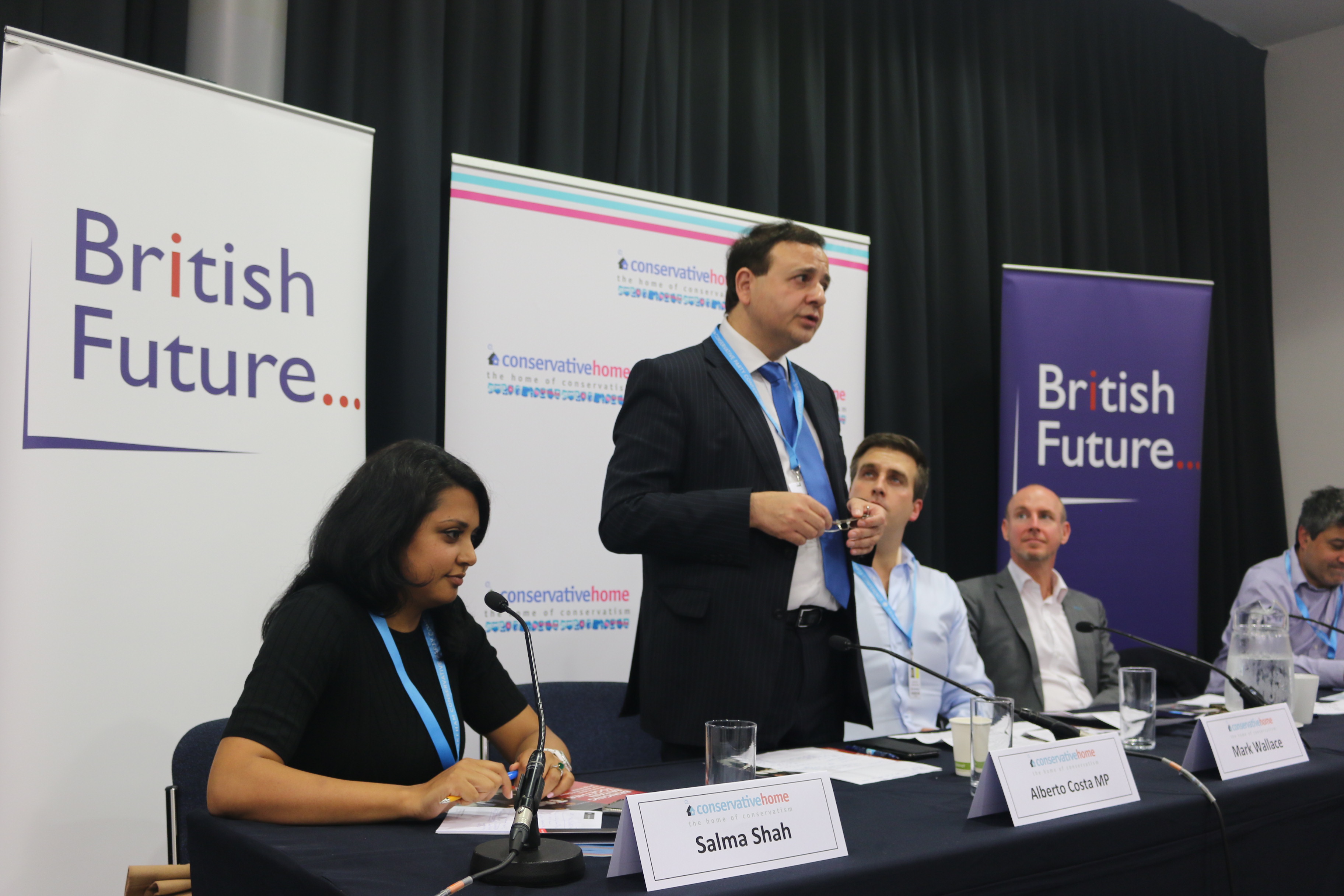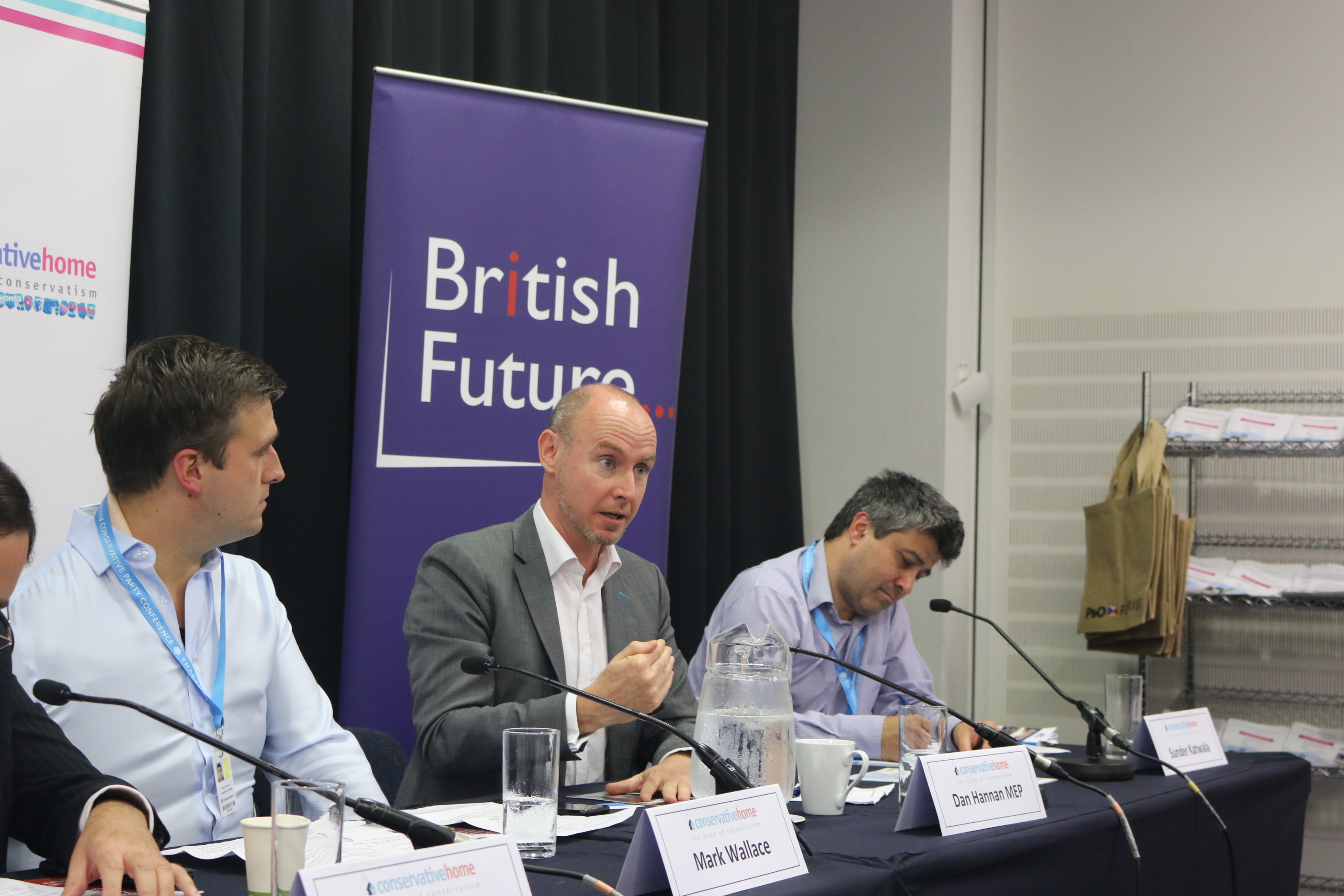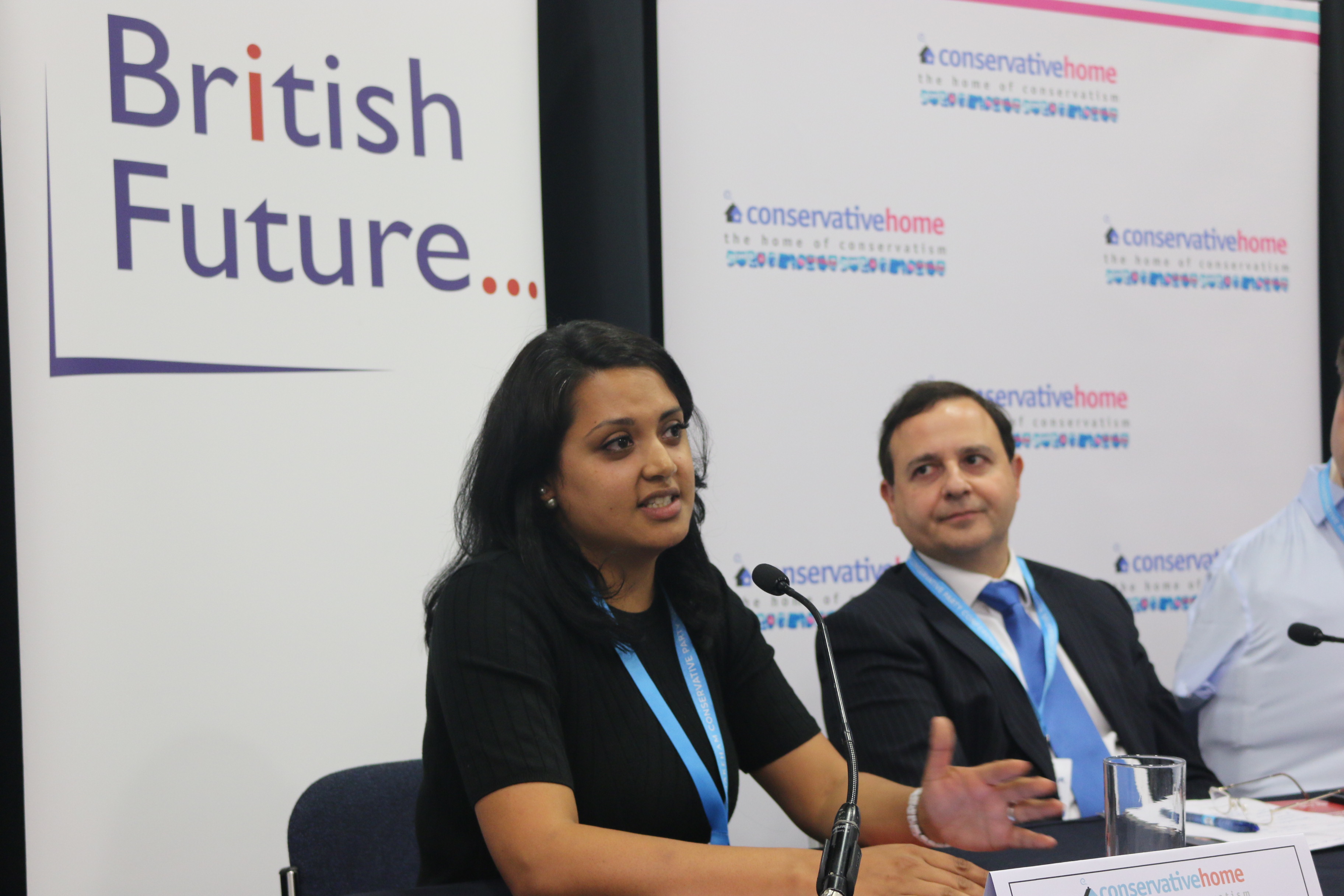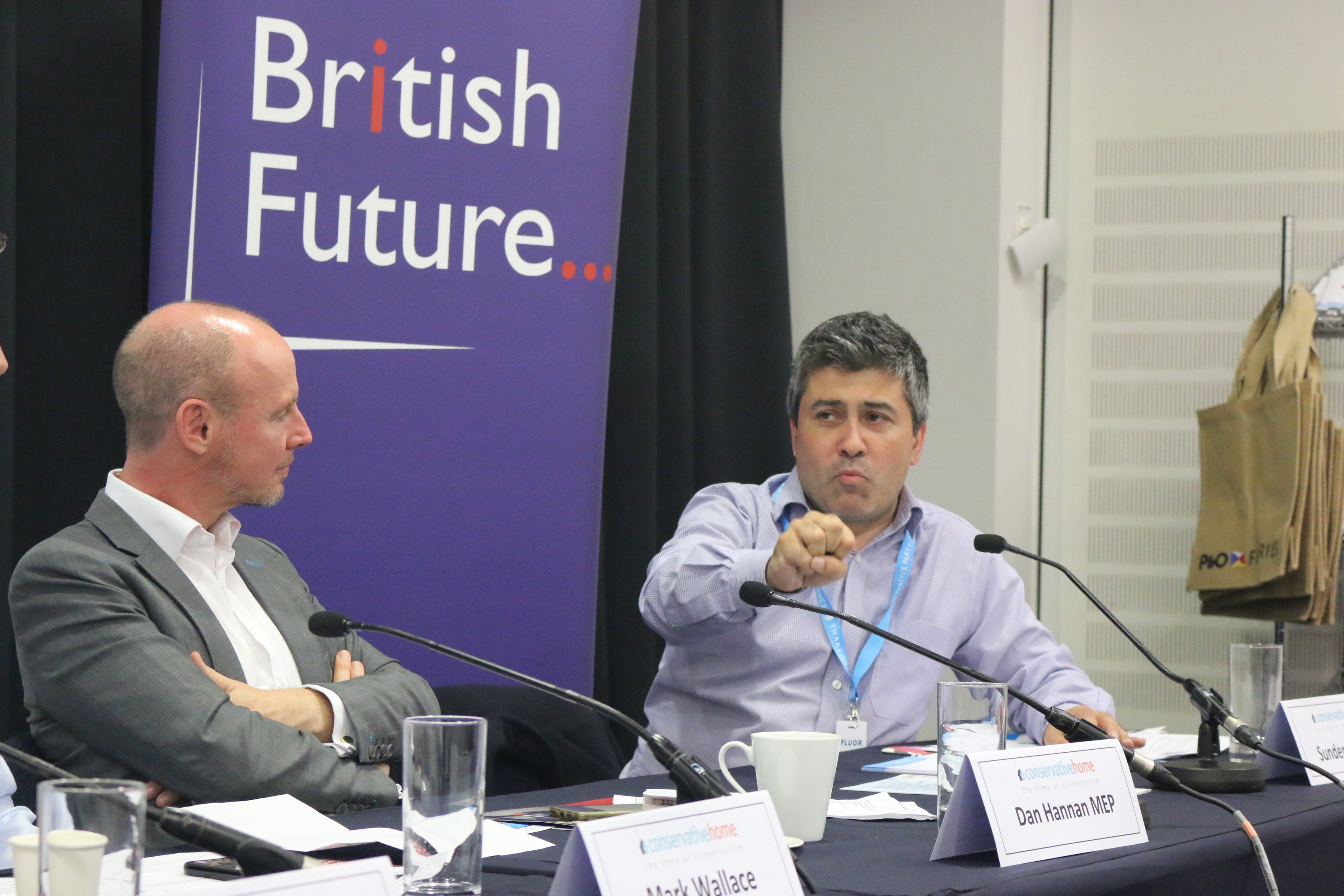Conservative Party Conference 2019
Event type:Date: 29/09/2019
Location: ConservativeHome, Central 5
The Government is heading for a new Windrush scandal if it does not legislate to entrench secure guarantees to prevent the risk that thousands of EU nationals in the UK would lose their legal status after Brexit, senior Conservative politicians have warned.
Speaking at a British Future and ConservativeHome fringe meeting at the party’s conference in Manchester, Alberto Costa MP and Daniel Hannan MEP said that the failure to secure the status of EU citizens in the UK could cast as long a shadow for the party, with 3 million EU nationals and their children, as Enoch Powell’s ‘Rivers of Blood’ speech had with ethnic minority voters over generations.
The fringe meeting, titled ‘When is Immigration Good for Britain?’, also heard from former Home Office special adviser Salma Shah and Sunder Katwala, Director of British Future, with Mark Wallace of ConservativeHome chairing.

“My mother was in tears when I had to apply for her right to remain in this country – and it was very distressing. I think it is profoundly repugnant that we have moved the goalposts for millions of people. I do not think that is what Brexit was about,” said Alberto Costa, the MP for Leicestershire South whose parents are Italian nationals.
“It is not a ‘generous offer’; it is repugnant,” Costa said of the EU settlement scheme in its current form. Because the rights granted by the EU settlement scheme were “not entrenched in primary law,” there is no legal protection of the commitments made should a future government choose to make changes.

“Promises matter,” said Daniel Hannan MEP, arguing that “The one totally uncontroversial aspect of the referendum campaign was that everybody agreed, during the campaign, that there should be no prejudice to the rights of EU nationals.” Hannan said that “the Farage/Banks” wing had caused plenty of headaches for the official Vote Leave campaign, but they too had agreed about this.
Hannan added that the Government under Theresa May had been far too slow in acting on this pledge, but that the new Government needed to take further steps to ensure that EU nationals legally resident in the UK would not lose their legal status after December 2020.
“Windrush isn’t over,” said Hannan, “and that is my greatest fear with regard to the EU nationals that are already here. We could be on the way to a new Windrush and it should not be controversial to say that everybody in the party should want to do everything possible to avoid that.”
Hannan suggested that a new commitment in law could address the problem of the December 2020 deadline removing the existing legal status of significant numbers of EU nationals in the UK.
“Instead of saying you need to apply to get the right to stay, we should state in law that everybody who is an EU national before Brexit does have the legal right to stay in the EU beyond Brexit,” he proposed. The EU settlement scheme could continue on that basis, he suggested, since EU nationals would want to be able to demonstrate their status, to employers and others. “You would then apply for the relevant documentation, but the difference would be that applying for that documentation is not applying for the right to stay,” he added.
The fringe panellists agreed that ethical commitments to those who were already in the UK needed to be separated from the question of a new post-Brexit system.
Costa said that the Conservatives should consider the long-term implications for the Conservative party if it did not secure the trust of EU nationals about protecting their rights.
“The damage that Enoch Powell did to our party is still incalculable,” Costa said, describing the party’s performance in winning just 20% of ethnic minority voters as “pathetic”. “As we demand that EU nationals apply for their rights, what message are we sending these 3 million people right now?” The MP noted that many European workers were relatively young people who would have families in Britain, who would naturalise as British, and have children who would become first-time voters over the next decade or two.

“The Conservative Party has for the most part failed on immigration,” said Salma Shah. The party had failed to meet the net migration target, she said, or to keep a promise – while also struggling with the branding issue of how to talk about immigration in a way that did not present them as the “same old Tories,” including in repairing relationships with citizens from ethnic minority backgrounds.
Daniel Hannan said that there were lessons from the success of the Canadian Conservative Party, which had won a higher share of the vote from migrant and minority voters than the Canadian-born. This was the result of sustained engagement and a positive approach to the contribution of migration to Canada.
The benefits and downsides of temporary migration for work versus settlement and citizenship, and what this could mean for a post-Brexit immigration system, became another central theme of the fringe meeting. Panellists offered different views about the links between economic migration and issues of cultural integration in Britain.
Daniel Hannan argued for an open approach for those seeking to migrate to take up a job – but with more distance between rights to work and other rights such as welfare access, family rights or routes to settlement. The MEP cited Singapore as an economy and society which made this distinction between migration for work and the status of citizens.
Sunder Katwala argued that temporary migration as a norm made integration harder – and that the White Paper’s proposals of 12-month work visas would increase the sense of churn and the pace of change.

“A Gastarbeiter model does not sound very British,” he said, arguing that Germany had changed its mind about this in the late 1990s, changing its policy that those who came from Turkey and their German-born children could not become citizens, so as to pursue a new agenda of integration and citizenship.
“A society shows it has failed on integration if it has the concept of the second-generation immigrant, or even the third-generation immigrant, for those who were born in that country – or even those whose parents were born in that country. I am proud to be a second-generation Briton, but I am not a second-generation immigrant,” he said.
“One of the best tests of integration across one generation is that the children of migrants have equal opportunities and an equal stake as full citizens in the identity of their country,” added Katwala.
Salma Shah and Daniel Hannan argued that there would be links between economic migration policy and future trade deals. Hannan said that any preferential arrangements with the European Union should be replicated outside the EU, arguing that free movement with Canada, Australia and New Zealand had broad public popularity – “there is enough cultural proximity that people can imagine themselves availing of that right,” as a reciprocal exchange, he said, arguing that those who claimed such an approach was based on racial preferences had an outdated view, failing to realise that Canada, New Zealand and Australia were, like the UK, rather more ethnically diverse than the European Union average.
Returning to the theme of promises made, Hannan said that the commitments made during the referendum implied that “we have a debt of honour to those who want to bring in qualified chefs from Bangladesh”.
“The fact that the ‘IN’ queue is longer than the ‘OUT’ queue is a good problem to have – it says something good about our country,” said Hannan, noting that the number of EU nationals in the UK was today higher than at the time of the referendum. “Today’s questions and answers on immigration will decide what Britain will look like in the future,” said Shah.






